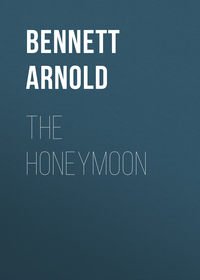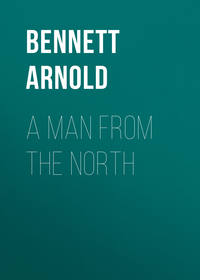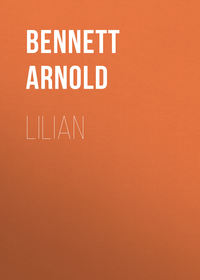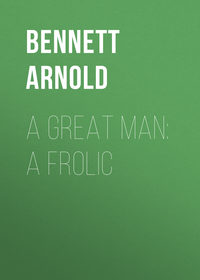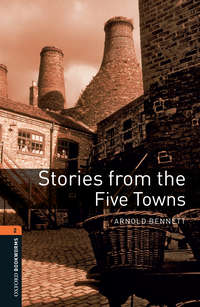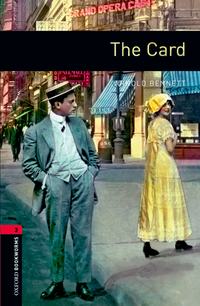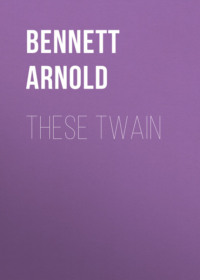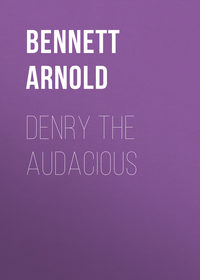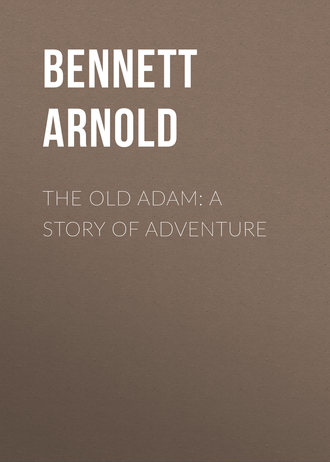 полная версия
полная версияThe Old Adam: A Story of Adventure
Nellie invaded the room. She had resumed the affray.
"Denry!" she reproached him, in an uncontrolled voice. "I'm ashamed of you! I really am!" She was no longer doing the dignified. The mask was off, and the unmistakable lineaments of the outraged mother appeared. That she should address him as "Denry" proved the intensity of her agitation. Years ago, when he had been made an alderman, his wife and his mother had decided that "Denry" was no longer a suitable name for him, and had abandoned it in favour of "Edward Henry."
He ceased playing.
"Why?" he protested, with a ridiculous air of innocence. "I'm only playing Chopin. Can't I play Chopin?"
He was rather surprised and impressed that she had recognised the piece for what it was. But of course she did, as a fact, know something about music, he remembered, though she never touched the "Pianisto."
"I think it's a pity you can't choose some other evening for your funeral marches!" she exclaimed.
"If that's it," said Edward Henry like lightning, "why did you stick me out you weren't afraid of hydrophobia?"
"I'll thank you to come up-stairs," she replied with warmth.
"Oh, all right, my dear! All right!" he cooed.
And they went up-stairs in a rather solemn procession.
IVNellie led the way to the chamber known as "Maisie's room," where the youngest of the Machins was wont to sleep in charge of the nurse, who, under the supervision of the mother of all three, had dominion over Robert, Ralph, and their little sister. The first thing that Edward Henry noticed was the screen which shut off one of the beds. The unfurling of the four-fold screen was always a sure sign that Nellie was taking an infantile illness seriously. It was an indication to Edward Henry of the importance of the dog-bite in Nellie's esteem. When all the chicks of the brood happened to be simultaneously sound, the screen reposed, inconspicuous, at an angle against a wall behind the door; but when pestilence was abroad, the screen travelled from one room to another in the wake of it, and, spreading wide, took part in the battle of life and death.
In an angle of the screen, on the side of it away from the bed and near the fire (in times of stress Nellie would not rely on radiators), sat old Mrs. Machin, knitting. She was a thin, bony woman of sixty-nine years, and as hard and imperishable as teak. So far as her son knew, she had only had two illnesses in her life. The first was an attack of influenza, and the second was an attack of acute rheumatism, which had incapacitated her for several weeks. Edward Henry and Nellie had taken advantage of her helplessness, then, to force her to give up her barbaric cottage in Brougham Street and share permanently the splendid comfort of their home. She existed in their home like a philosophic prisoner of war at the court of conquerors, behaving faultlessly, behaving magnanimously in the melancholy grandeur of her fall, but never renouncing her soul's secret independence, nor permitting herself to forget that she was on foreign ground. When Edward Henry looked at those yellow and seasoned fingers which, by hard manual labour, had kept herself and him in the young days of his humble obscurity, and which, during sixty years had not been idle for more than six weeks in all, he grew almost apologetic for his wealth. They reminded him of the day when his total resources were five pounds, won in a wager, and of the day when he drove proudly about behind a mule collecting other people's rents, and of the glittering day when he burst in on her from Llandudno with over a thousand gold sovereigns in a hat-box, – product of his first great picturesque coup, – imagining himself to be an English Jay Gould. She had not blenched even then. She had not blenched since. And she never would blench. In spite of his gorgeous position and his unique reputation, in spite of her well-concealed but notorious pride in him, he still went in fear of that ageless woman, whose undaunted eye always told him that he was still the lad Denry, and her inferior in moral force. The curve of her thin lips seemed ever to be warning him that with her pretensions were quite useless, and that she saw through him, and through him to the innermost grottoes of his poor human depravity.
He caught her eye guiltily.
"Behold the alderman!" she murmured with grimness.
That was all. But the three words took thirty years off his back, snatched the half-crown cigar out of his hand, and reduced him again to the raw, hungry boy of Brougham Street. And he knew that he had sinned gravely in not coming up-stairs very much earlier.
"Is that you, Father?" called the high voice of Robert from the back of the screen.
He had to admit to his son that it was he.
The infant lay on his back in Maisie's bed, while his mother sat lightly on the edge of nurse's bed near-by.
"Well, you're a nice chap!" said Edward Henry, avoiding Nellie's glance, but trying to face his son as one innocent man may face another, and not perfectly succeeding. He never could feel like a real father somehow.
"My temperature's above normal," announced Robert proudly, and then added with regret, "but not much!"
There was the clinical thermometer-instrument which Edward Henry despised and detested as being an inciter of illnesses-in a glass of water on the table between the two beds.
"Father!" Robert began again.
"Well, Robert?" said Edward Henry cheerfully.
He was glad that the child was in one of his rare loquacious moods, because the chatter not only proved that the dog had done no serious damage, – it also eased the silent strain between himself and Nellie.
"Why did you play the Funeral March, Father?" asked Robert; and the question fell into the tranquillity of the room rather like a bomb that had not quite decided whether or not to burst.
For the second time that evening Edward Henry was dashed.
"Have you been meddling with my music-rolls?"
"No, Father. I only read the labels."
This child simply read everything.
"How did you know I was playing a funeral march?" Edward Henry demanded.
"Oh, I didn't tell him!" Nellie put in, excusing herself before she was accused. She smiled benignly, as an angel woman, capable of forgiving all. But there were moments when Edward Henry hated moral superiority and Christian meekness in a wife. Moreover, Nellie somewhat spoiled her own effect by adding with an artificial continuation of the smile, "You needn't look at me!"
Edward Henry considered the remark otiose. Though he had indeed ventured to look at her, he had not looked at her in the manner which she implied.
"It made a noise like funerals and things," Robert explained.
"Well, it seems to me, you have been playing a funeral march," said Edward Henry to the child.
He thought this rather funny, rather worthy of himself, but the child answered with ruthless gravity and a touch of disdain, for he was a disdainful child, without bowels:
"I don't know what you mean, Father." The curve of his lips (he had his grandmother's lips) appeared to say, "I wish you wouldn't try to be silly, Father." However, youth forgets very quickly, and the next instant Robert was beginning once more, "Father!"
"Well, Robert?"
By mutual agreement of the parents, the child was never addressed as "Bob" or "Bobby," or by any other diminutive. In their practical opinion a child's name was his name, and ought not to be mauled or dismembered on the pretext of fondness. Similarly, the child had not been baptised after his father, or after any male member of either the Machin or the Cotterill family. Why should family names be perpetuated merely because they were family names? A natural human reaction, this, against the excessive sentimentalism of the Victorian era!
"What does 'stamped out' mean?" Robert enquired.
Now Robert, among other activities, busied himself in the collection of postage-stamps, and in consequence his father's mind, under the impulse of the question, ran immediately to postage-stamps.
"Stamped out?" said Edward Henry, with the air of omniscience that a father is bound to assume. "Postage-stamps are stamped-out-by a machine-you see."
Robert's scorn of this explanation was manifest.
"Well," Edward Henry, piqued, made another attempt, "you stamp a fire out with your feet." And he stamped illustratively on the floor. After all, the child was only eight.
"I knew all that before," said Robert coldly. "You don't understand."
"What makes you ask, dear? Let us show Father your leg." Nellie's voice was soothing.
"Yes," Robert murmured, staring reflectively at the ceiling. "That's it. It says in the encyclopedia that hydrophobia is stamped out in this country-by Mr. Long's muzzling order. Who is Mr. Long?"
A second bomb had fallen on exactly the same spot as the first, and the two exploded simultaneously. And the explosion was none the less terrible because it was silent and invisible. The tidy domestic chamber was strewn in a moment with an awful mass of wounded susceptibilities. Beyond the screen the nick-nick of grandmother's steel needles stopped and started again. It was characteristic of her temperament that she should recover before the younger generations could recover. Edward Henry, as befitted his sex, regained his nerve a little earlier than Nellie.
"I told you never to touch my encyclopedia," said he sternly. Robert had twice been caught on his stomach on the floor with a vast volume open under his chin, and his studies had been traced by vile thumb-marks.
"I know," said Robert.
Whenever anybody gave that child a piece of unsolicited information, he almost invariably replied, "I know."
"But hydrophobia!" cried Nellie. "How did you know about hydrophobia?"
"We had it in spellings last week," Robert explained.
"The deuce you did!" muttered Edward Henry.
The one bright fact of the many-sided and gloomy crisis was the very obvious truth that Robert was the most extraordinary child that ever lived.
"But when on earth did you get at the encyclopedia, Robert?" his mother exclaimed, completely at a loss.
"It was before you came in from Hillport," the wondrous infant answered. "After my leg had stopped hurting me a bit."
"But when I came in Nurse said it had only just happened!"
"Shows how much she knew!" said Robert, with contempt.
"Does your leg hurt you now?" Edward Henry enquired.
"A bit. That's why I can't go to sleep, of course."
"Well, let's have a look at it." Edward Henry attempted jollity.
"Mother's wrapped it all up in boracic wool."
The bed-clothes were drawn down and the leg gradually revealed. And the sight of the little soft leg, so fragile and defenceless, really did touch Edward Henry. It made him feel more like an authentic father than he had felt for a long time. And the sight of the red wound hurt him. Still, it was a beautifully clean wound, and it was not a large wound.
"It's a clean wound," he observed judiciously. In spite of himself, he could not keep a certain flippant harsh quality out of his tone.
"Well, I've naturally washed it with carbolic," Nellie returned sharply.
He illogically resented this sharpness.
"Of course he was bitten through his stocking?"
"Of course," said Nellie, re-enveloping the wound hastily, as though Edward Henry was not worthy to regard it.
"Well, then, by the time they got through the stocking, the animal's teeth couldn't be dirty. Every one knows that."
Nellie shut her lips.
"Were you teasing Carlo?" Edward Henry demanded curtly of his son.
"I don't know."
Whenever anybody asked that child for a piece of information, he almost invariably replied, "I don't know."
"How, you don't know? You must know whether you were teasing the dog or not!" Edward Henry was nettled.
The renewed spectacle of his own wound had predisposed Robert to feel a great and tearful sympathy for himself. His mouth now began to take strange shapes and to increase magically in area, and beads appeared in the corners of his large eyes.
"I-I was only measuring his tail by his hind leg," he blubbered, and then sobbed.
Edward Henry did his best to save his dignity.
"Come, come!" he reasoned, less menacingly. "Boys who can read enyclopedias mustn't be cry-babies. You'd no business measuring Carlo's tail by his hind leg. You ought to remember that that dog's older than you." And this remark, too, he thought rather funny, but apparently he was alone in his opinion.
Then he felt something against his calf. And it was Carlo's nose. Carlo was a large, very shaggy and unkempt Northern terrier, but owing to vagueness of his principal points, due doubtless to a vagueness in his immediate ancestry, it was impossible to decide whether he had come from the north or the south side of the Tweed. This aging friend of Edward Henry's, surmising that something unusual was afoot in his house, and having entirely forgotten the trifling episode of the bite, had unobtrusively come to make enquiries.
"Poor old boy!" said Edward Henry, stooping to pat the dog. "Did they try to measure his tail with his hind leg?"
The gesture was partly instinctive, for he loved Carlo; but it also had its origin in sheer nervousness, in sheer ignorance of what was the best thing to do. However, he was at once aware that he had done the worst thing. Had not Nellie announced that the dog must be got rid of? And here he was fondly caressing the bloodthirsty dog! With a hysterical movement of the lower part of her leg, Nellie pushed violently against the dog, – she did not kick, but she nearly kicked, – and Carlo, faintly howling a protest, fled.
Edward Henry was hurt. He escaped from between the beds, and from that close, enervating domestic atmosphere where he was misunderstood by women and disdained by infants. He wanted fresh air; he wanted bars, whiskies, billiard-rooms, and the society of masculine men about town. The whole of his own world was against him.
As he passed by his knitting mother, she ignored him and moved not. She had a great gift of holding aloof from conjugal complications.
On the landing he decided that he would go out at once into the major world. Half-way down the stairs he saw his overcoat on the hall-stand, beckoning to him and offering release.
Then he heard the bedroom door and his wife's footsteps.
"Edward Henry!"
"Well?"
He stopped and looked up inimically at her face, which overhung the banisters. It was the face of a woman outraged in her most profound feelings, but amazingly determined to be sweet.
"What do you think of it?"
"What do I think of what? The wound?"
"Yes."
"Why, it's simply nothing. Nothing at all. You know how that kid always heals up quickly. You won't be able to find the wound in a day or two."
"Don't you think it ought to be cauterised at once?"
He moved downwards.
"No, I don't. I've been bitten three times in my life by dogs, and I was never cauterised."
"Well, I do think it ought to be cauterised." She raised her voice slightly as he retreated from her. "And I shall be glad if you'll call in at Dr. Stirling's and ask him to come round."
He made no reply, but put on his overcoat and his hat, and took his stick. Glancing up the stairs, he saw Nellie was now standing at the head of them, under the electric light there, and watching him. He knew that she thought he was cravenly obeying her command. She could have no idea that before she spoke to him he had already decided to put on his overcoat and hat and take his stick and go forth into the major world. However, that was no affair of his.
He hesitated a second. Then the nurse appeared out of the kitchen with a squalling Maisie in her arms, and ran up-stairs. Why Maisie was squalling, and why she should have been in the kitchen at such an hour instead of in bed, he could not guess; but he could guess that if he remained one second longer in that exasperating minor world he would begin to smash furniture, and so he quitted it.
VIt was raining slightly, but he dared not return to the house for his umbrella. In the haze and wet of the shivering October night, the clock of Bleakridge Church glowed like a fiery disk suspended in the sky; and, mysteriously hanging there, without visible means of support, it seemed to him somehow to symbolise the enigma of the universe and intensify his inward gloom. Never before had he had such feelings to such a degree. It is scarcely an exaggeration to say that never before had the enigma of the universe occurred to him. The side gates clicked as he stood hesitant under the shelter of the wall, and a figure emerged from his domain. It was Bellfield, the new chauffeur, going across to his home in the little square in front of the church. Bellfield touched his cap with an eager and willing hand, as new chauffeurs will.
"Want the car, sir? Setting in for a wet night!"
"No, thanks."
It was a lie. He did want the car. He wanted the car so that he might ride right away into a new and more interesting world, or at any rate into Hanbridge, centre of the pleasures, the wickedness, and the commerce of the Five Towns. But he dared not have the car. He dared not have his own car. He must slip off, noiseless and unassuming. Even to go to Dr. Stirling's he dared not have the car. Besides, he could have walked down the hill to Dr. Stirling's in three minutes. Not that he had the least intention of going to Dr. Stirling's. No! His wife imagined that he was going; but she was mistaken. Within an hour, when Dr. Stirling had failed to arrive, she would doubtless telephone, and get her Dr. Stirling. Not, however, with Edward Henry's assistance!
He reviewed his conduct throughout the evening. In what particular had it been sinful? In no particular. True, the accident to the boy was a misfortune, but had he not borne that misfortune lightly, minimised it, and endeavoured to teach others to bear it lightly? His blithe humour ought surely to have been an example to Nellie! And as for the episode of the funeral march on the "Pianisto," really, really, the tiresome little thing ought to have better appreciated his whimsical drollery!
But Nellie was altered; he was altered; everything was altered. He remembered the ecstasy of their excursion to Switzerland. He remembered the rapture with which, on their honeymoon, he had clasped a new opal bracelet on her exciting arm. He could not possibly have such sensations now. What was the meaning of life? Was life worth living? The fact was, he was growing old. Useless to pretend to himself that it was not so. Both he and she were growing old. Only, she seemed to be placidly content, and he was not content. And more and more the domestic atmosphere and the atmosphere of the district fretted and even annoyed him. To-night's affair was not unique, but it was a culmination. He gazed pessimistically north and south along the slimy expanse of Trafalgar Road, which sank northwards in the direction of Dr. Stirling's, and southwards in the direction of joyous Hanbridge. He loathed and despised Trafalgar Road. What was the use of making three hundred and forty-one pounds by a shrewd speculation? None. He could not employ three hundred and forty-one pounds to increase his happiness. Money had become futile for him. Astounding thought! He desired no more of it. He had a considerable income from investments, and also at least four thousand a year from the Five Towns Universal Thrift Club, that wonderful but unpretentious organisation which now embraced every corner of the Five Towns; that gorgeous invention for profitably taking care of the pennies of the working classes; that excellent device, his own, for selling the working classes every kind of goods at credit prices after having received part of the money in advance!
"I want a change!" he said to himself, and threw away his cigar.
After all, the bitterest thought in his heart was perhaps that on that evening he had tried to be a "card," and, for the first time in his brilliant career as a "card," had failed. He, Henry Machin, who had been the youngest mayor of Bursley years and years ago; he, the recognised amuser of the Five Towns; he, one of the greatest "characters" that the Five Towns had ever produced-he had failed of an effect!
He slipped out on to the pavement, and saw, under the gas-lamp, on the new hoarding of the football-ground, a poster intimating that during that particular week there was a gigantic attraction at the Empire Music Hall at Hanbridge. According to the posters, there was a gigantic attraction every week at the Empire, but Edward Henry happened to know that this week the attraction was indeed somewhat out of the common. And to-night was Friday, the fashionable night for the bloods and the modishness of the Five Towns. He looked at the church clock, and then at his watch. He would be in time for the "second house," which started at nine o'clock. At the same moment an electric tram-car came thundering up out of Bursley. He boarded it, and was saluted by the conductor. Remaining on the platform, he lit a cigarette, and tried to feel cheerful; but he could not conquer his depression.
"Yes," he thought, "what I want is change-and a lot of it too!"
CHAPTER II
THE BANK-NOTE
IAlderman Machin had to stand at the back, and somewhat towards the side, of that part of the auditorium known as the Grand Circle at the Empire Music Hall, Hanbridge. The attendants at the entrance and in the lounge, where the salutation "Welcome" shone in electricity over a large Cupid-surrounded mirror, had compassionately and yet exultingly told him that there was not a seat left in the house. He had shared their exultation. He had said to himself, full of honest pride in the Five Towns: "This music-hall, admitted by the press to be one of the finest in the provinces, holds over two thousand five hundred people. And yet we can fill it to overflowing twice every night! And only a few years ago there wasn't a decent music-hall in the entire district!"
The word "progress" flitted through his head.
It was not strictly true that the Empire was or could be filled to overflowing twice every night, but it was true that at that particular moment not a seat was unsold; and the aspect of a crowded auditorium is apt to give an optimistic quality to broad generalisations. Alderman Machin began instinctively to calculate the amount of money in the house, and to wonder whether there would be a chance for a second music-hall in the dissipated town of Hanbridge. He also wondered why the idea of a second music-hall in Hanbridge had never occurred to him before.
The Grand Circle was so-called because it was grand. Its plush fauteuils cost a shilling, no mean price for a community where seven pounds of potatoes can be bought for sixpence, and the view of the stage therefrom was perfect. But the alderman's view was far from perfect, since he had to peer as best he could between and above the shoulders of several men, each apparently, but not really, taller than himself. By constant slight movements to comply with the movements of the rampart of shoulders, he could discern fragments of various advertisements of soap, motor-cars, whisky, shirts, perfume, pills, bricks, and tea, for the drop-curtain was down. And, curiously, he felt obliged to keep his eyes on the drop-curtain, and across the long intervening vista of hats and heads and smoke, to explore its most difficult corners again and again, lest, when it went up, he might not be in proper practice for seeing what was behind it.
Nevertheless, despite the marked inconveniences of his situation, he felt brighter, he felt almost happy in this dense atmosphere of success. He even found a certain peculiar and perverse satisfaction in the fact that he had as yet been recognised by nobody. Once or twice the owners of shoulders had turned and deliberately glared at the worrying fellow who had the impudence to be all the time peeping over them and between them; they had not distinguished the fellow from any ordinary fellow. Could they have known that he was the famous Alderman Edward Henry Machin, founder and sole proprietor of the Thrift Club, into which their wives were probably paying so much a week, they would most assuredly have glared to another tune, and they would have said with pride afterwards, "That chap Machin o' Bursley was standing behind me at the Empire to-night." And though Machin is amongst the commonest names in the Five Towns, all would have known that the great and admired Denry was meant. It was astonishing that a personage so notorious should not have been instantly "spotted" in such a resort as the Empire. More proof that the Five Towns was a vast and seething concentration of cities, and no longer a mere district where everybody knew everybody.


